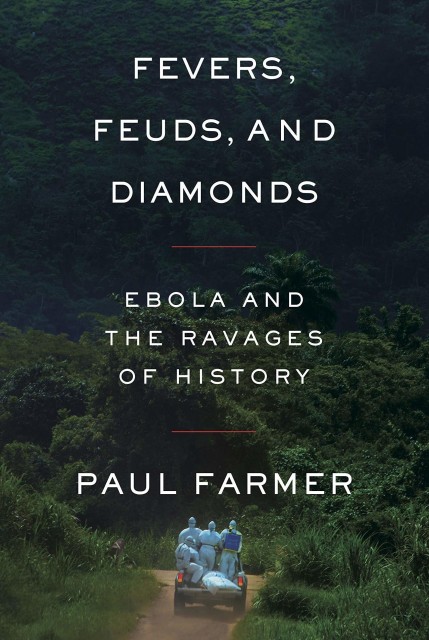Ebola and the Ravages of History
In Paul Farmer style, "Fevers, Feuds, and Diamonds: Ebola and the Ravages of History" (2020) weaves together personal encounters with life histories, colonial histories, and public health. This is well worth the read - all 653 pages of it. When I picked up this book, we got the unfortunate news of the passing of Dr Farmer. For those unaware of his works, do seek them out, such as Infections and Inequalities (1999), Pathologies of Power (2005), and Partner to the Poor (2010), amongst many others.
A few notes (particularly in knowledge production and dissemination):
- "good news from the United States and Europe [that Ebola was treatable] seemed to make little difference to patients in West African ETUs, who were being provided with the bare minimum - right then and there, only cups of ORS, which many were unable to keep down. Most were dying." (p. XV)
- "It's hard to fault beleaguered West African health professionals for missing these cues. Few - even those who'd helped conduct these studies - had access to the expensive scientific journals in which these surveys were published. Nor had local facilities been left with improved lab capacity for diagnosing the varied causes of febrile illness after expatriate researchers returned to Europe." (p. 15)
- "Radio spots, commissioned songs, and billboards showcased a confusing set of troubling, punitive, or contradictory messages and commands: Ebola is real, not caused by witchcraft or curses. It kills 90 percent of those afflicted. Don't eat bushmeat. Don't eat bats. Don't eat plums (which few West Africans seemed to fancy) gnawed on by bats. Don't play with or eat baboons (a species absent from the region in which the spillover event was held to occur) or monkeys of any sort. Don't touch your sick or bury your dead, or you'll be punished. Don't shake hands. Don't touch anyone at all, ever. Stay at home, or shelter in place. Go to a hospital. Don't go to a hospital, as there's no known treatment for Ebola. Go to an isolation center. Isolate yourself if you can't get to one of those because of travel bans. Practice social distancing." (p. 20)
- "One study put the number at more than 8 percent. That meant that the virus wasn't only present in eastern Sierra Leone; it wasn't rare. These findings had been presented in scientific meetings and in a manuscript submitted for publication in an academic journal months before Patient Zero fell ill. Improbably, the article was rejected, with at least one reviewer arguing he just didn't believe Ebola occurred in West Africa. It didn't appear in print until shortly before the Kenema facility's director and many of his nursing colleagues were dead of Ebola." (p. 25)
- "I've claimed in this book that epidemic disease rarely collided with modern medicine within Upper West Africa, in spite of superpower promises of development assistance to attain whatever happened to be defined at any given moment as modernity. This general rule held true during the Cold War, a feud during which the body count was high only in former colonies. Until the advent of cell phones, collisions with material modernity in Upper West Africa were more likely to consist of encounters with the machinery of mechanized extraction of mineral wealth—or with automatic weapons and rocket-propelled grenades—than with Xray or surgical suites, or modern laboratories." (p. 339)
Featured Posts
Tags
Ethics
Development
Institutions
Gender
Fellowship
Racism
Participation
Islam
Anthropology
Sustainability
Capitalism
Leadership
Resilience
Food Security
Books
Conflict
Middle East
Agriculture
South Africa
Development Studies
Colonization
Culture
Revolution
Power
Inequality
Civil society
Ethnography
decolonization
History
Ethiopia
Colonialism
Interdisciplinary
Land
Post-doc
Globalization
Economics
International development
Policy
Human Rights
Democracy
Politics
Rural Development
Migration
Poverty
Ideology
Climate change
Qatar
Africa
Governance
Education

